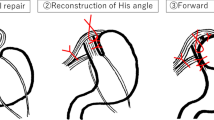Abstract
Background: Laparoscopic fundoplication has become the standard for operative treatment of gastroesophageal reflux disease (GERD). Methods: We reviewed our experience with 1,000 consecutive patients receiving laparoscopic fundoplication for GERD (n = 882) or paraesophageal hernia (n = 118) between October 1991 and July 1999. Patients with achalasia and failed fundoplication were excluded from analysis. All the patients were evaluated preoperatively by upper endoscopy, esophageal manometry, and barium swallow. After 1994, 24-h pH monitoring was performed selectively in patients with extraesophageal symptoms and/or those without erosive esophagitis. There were 490 men 510 women in this review. Their mean age was 49 years. Procedures performed were 360° floppy fundoplication (n = 879), 360° fundoplication without fundus mobilization (Rossetti) (n = 22), 270° posterior fundoplication (n = 96), and anterior fundoplication (n = 2). Esophageal lengthening procedure (Collis gastroplasty) was performed in combination with fundoplication in 15 patients. In seven patients the treatment was converted to open fundoplication. Outcomes: The average length of hospitalization was 2.2 days, and 136 patients stayed longer than 2 days. Major complications occurred in 21 patients: esophageal perforation (n= 10), acute paraesophageal herniation (n = 4), splenic bleeding (n = 2), cardiac arrest (n = 1), pneumonia (n = 3), and testicular abscess (n = 1). Additional operations were required to manage the complications in 14 patients (70%): Four of these procedures were performed emergently, and 10 patients underwent reoperation between 6 h and 10 days. There were three deaths, all of which involved elderly patients with paraesophageal hernia. There were 35 late failures requiring reoperation for recurrence of GERD or development of new symptoms: The treatment of 32 patients was revised laparoscopically, and 4 patients required laparotomy. Beyond 1 year (median follow-up period, 27 months), 94% of the reviewed patients were satisfied with their surgical outcome.
Similar content being viewed by others
Author information
Authors and Affiliations
Additional information
apd: 7 May 2001
Rights and permissions
About this article
Cite this article
Terry, M., Smith, C., Branum, G. et al. Outcomes of laparoscopic fundoplication for gastroesophageal reflux disease and paraesophageal hernia. Surg Endosc 15, 691–699 (2001). https://doi.org/10.1007/s004640080144
Received:
Accepted:
Published:
Issue Date:
DOI: https://doi.org/10.1007/s004640080144




